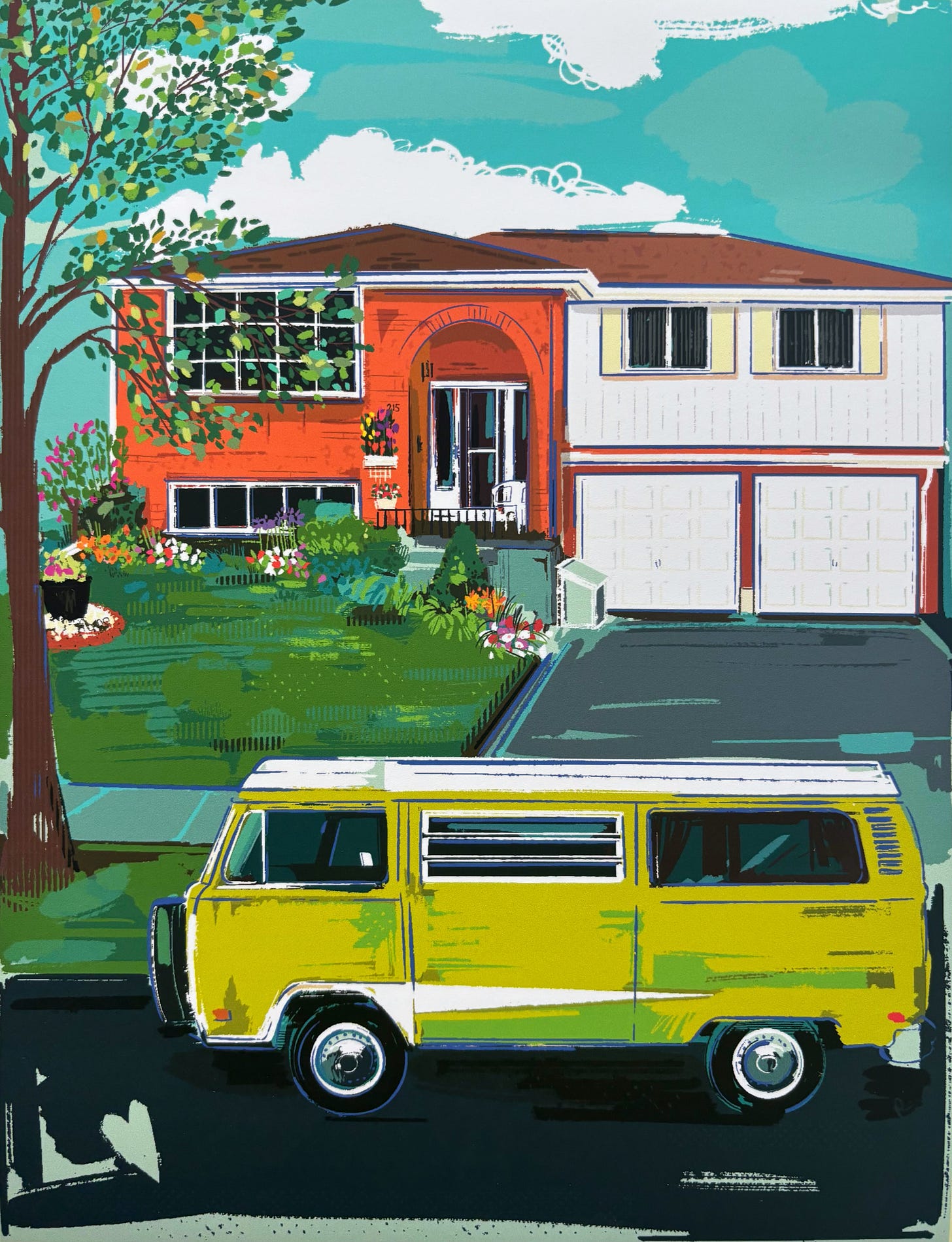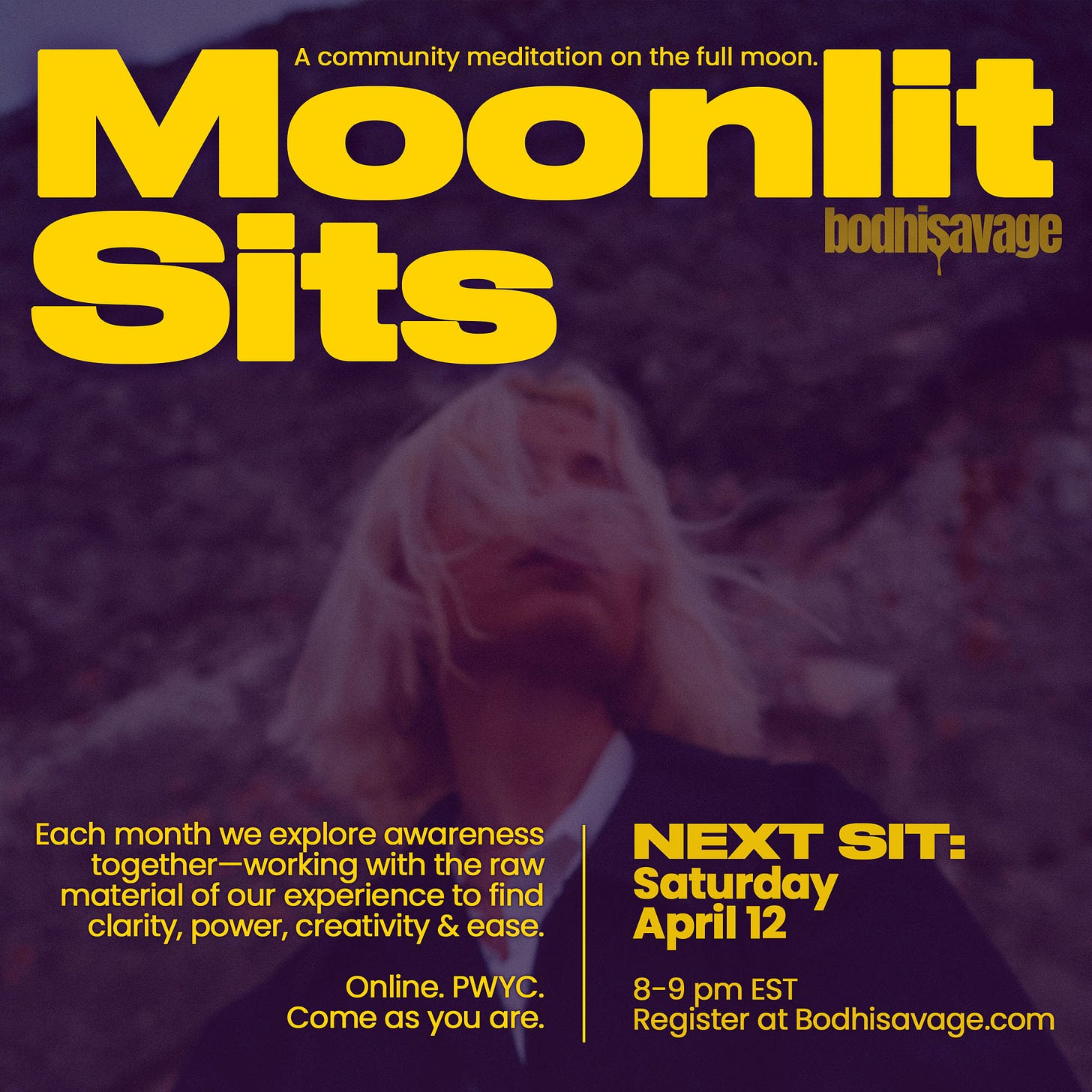On Letting Go of What You Love
Being intimate with the magic of the moment without holding on
We’re selling the family home. The house where my mom and uncles grew up. The house where I grew up.
I’ve known it was coming — my grandfather turns 90 this year and can’t live alone anymore. But it’s one thing to watch it on the horizon, and another to find yourself kneeling on the shag carpet of your teenage bedroom, sorting through a box of your grandma’s jewelry.
You look around at the residue of so much life, and suddenly, feel the swelling urge to gather it all up into your arms and never let go.
That ache in the solar plexus. That flicker of panic: This cannot go. This defines me. That tender, all-too-human impulse is what the Buddhists call grasping.

The letting go happens in increments. Each drawer emptied, each photo packed, each decision a tiny severing. It’s something more primal than grief. It’s the sense that the self — the one that feels so permanent — is dissolving. That all the little pieces of your identity are scattering, and you can’t stop it.
But as they say, nothing gold can stay.
Last month here at Bodhisavage, we explored anger — the pushing away of what we don’t like. But I’d venture that its opposite, grasping, the clutching to our chests of what we love, is even more poetically human.
It happens every day: We encounter beauty, comfort, pleasure — something that feels like a beacon of safety in an otherwise random and spooky world. And for a moment, we’re fully present. Lit up. Open.
It could be the way you felt in someone’s company. The ineffable way the sunlight fills a room. The loose, open feeling that comes after a few glasses of wine. A sense of aliveness that feels truer somehow.
But in the next moment, we tighten around it. We try to make the magic permanent. To make it define us.
Suddenly, we’re clinging to the person who made us feel special. We need to own the sunlit house. Or we chase that giddy wine high every day at happy hour.
I see grasping in the artists I mentor, too. A new songwriter will make a track that surprises them, and for a moment, they’re full of wonder and wanting to share it. But then the fear creeps in:
What if I put this out and someone steals it? Plagiarizes it? Or worse: What if no one likes it?
The impulse is to freeze the magic. To control it and everything that might happen to it. They tighten around the precious thing, like Gollum clutching the ring.
What they’re really saying is: What if this is all I’ve got?
“Give it to the world anyway, and begin again,” I tell them every time.
To be an artist is to practice letting go of what you love — over and over. You worry the magic is unrepeatable. But you offer it anyway. And you trust that it will return in another form, through another fire.
Impermanence is a principle of harmony. When we don’t struggle against it, we are in harmony with reality. - Pema Chödrön
Being present with impermanence is like standing on a burning frontier. There is a total, luminous consummation of awareness and experience. But the fire of aliveness keeps moving to the next moment. And if we step off to cling to what’s passed, we end up clutching only ashes.
In the Five Wisdoms (the Buddhist psychological map of human intelligence we’ve been wending our way through these past months) the wisdom hidden inside grasping is called discernment.
Discernment is the part of awareness that sees clearly what makes something unique. When we’re open, we can recognize beauty without needing to possess it. We see what makes that person special, that song, that particular day — and we hold the experience with an open hand. We recognize that in experiencing something, we already have it. And that in experiencing it, it’s already gone.
But when discernment gets twisted by fear, it becomes obsessive. Hungry. It wants the beautiful thing to be mine. It wants the experience to last. It wants to bottle the magic and do it again. We know nothing lasts forever, but fucked if we’re not gunna try.
And in the chasm between that wish and the truth of impermanence, suffering blooms.
Discernment cuts through those extremes and says:
Live fully. Love fully. Enter the moment completely — and let go.
So I’m practicing, here in the house where my family became itself. Not by detaching, but by softening when the ache arises.
I see the arrangement of furniture in the living room for one last time and relax through the lump in my throat. I laugh with my uncle about strange things we find: a monkey candleholder, a three-legged dog sculpture. I gather my grandmother’s clothes to my face and breathe deeply.
This, too, is discernment. There is beauty here. But the moment is already over — and my task is to offer the magic I feel to the next moment.
And in that loosening, I come alive. I imagine new children climbing the trees in the backyard. New laughter filling these quiet halls. The fire moving on. The next moment already beginning.
Nothing hoarded, nothing held.
This month at Bodhisavage, we’ll explore what it means to let experience burn clean. Through essays, meditations, and creative prompts, we’ll stay at the bright edge of impermanence, without reaching back for the ashes.
Join me for this month’s Moonlit Sit! Bring yourself and whatever you’re holding too tightly. All are welcome.
❤️ Lama Tasha
🌕April Moonlit Sit
🗓 DATE: Saturday, April 12, 2025
🕗 TIME: 8-9pm EST
📍LOCATION: Online (Zoom link emailed on registration)
TOPIC: Holding the Magic with an Open Hand
In this meditation, we let the wisdom of discernment and the truth of impermanence show us what is beautiful, fleeting, and alive, and practice holding it all with an open hand.
💛 DANA: This session is open to all on a donation basis. To support this work, you can donate during registration or become a paid subscriber on Substack.






Your writing is so tender and deep. Thank you. 🙏🏽
I’ve clung desperately to so many wondrous moments futilely, as if I could hoard them in a box. Unconsciously depending on them like narcotics or my next fix to ease pain.
Like our dreams, the moments come and fade. Upon awakening, sometimes if we grasp too hard and force remembering they fade even quicker.
This is so beautifully written. It’s such a lovely way to look at things that come into our lives, no matter what the duration. It’s always going to have been a part of our life experience.